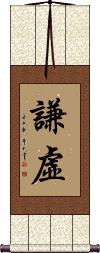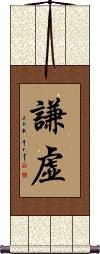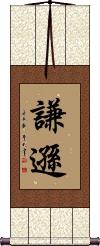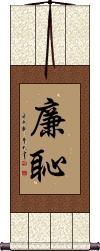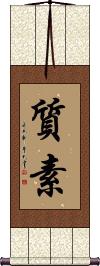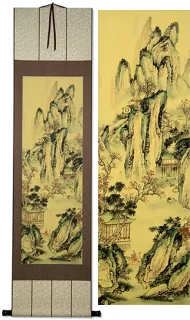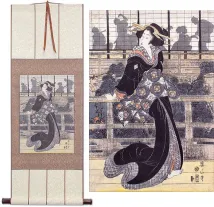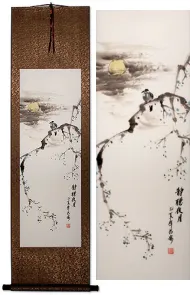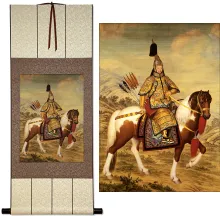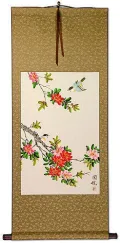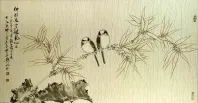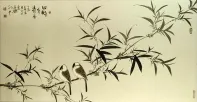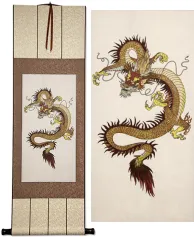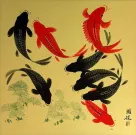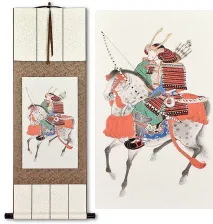Many custom options...
And formats...

Not what you want?
Try other similar-meaning words, fewer words, or just one word.
Feet on the Ground in Chinese / Japanese...
Buy a Feet on the Ground calligraphy wall scroll here!
Personalize your custom “Feet on the Ground” project by clicking the button next to your favorite “Feet on the Ground” title below...
1. Keep Your Feet on the Ground
3. Humble / Modesty / Humility
5. Sense of Shame / Sense of Honor / Integrity / Modesty
6. Modesty
Keep Your Feet on the Ground
Be Down-to-Earth
腳踏實地 is a four-character proverb that suggests that you should be practical, realistic, and grounded.
Some translate this as a suggestion to be down-to-earth.
The first character means “feet.”
The second means “step on” or “stand.”
The third means “solid,” “real,” or “true.”
The last character means “ground,” “earth,” or “terra.”
Literally, this means “[keep your] Feet Standing [on] Solid Ground.”
Humble / Modest
謙虛 can also be translated as humbleness or humility.
In Chinese and Korean, the first character means “modest.” The second means “empty.” Together these characters reinforce the ideas of modesty and being empty of ego.
![]() In Japan, they tend to use a slightly-simplified version of the second Kanji for this word. It also happens to be an alternate/simplified version used in China too. If you want to order the modern Japanese/simplified version, just click in the Kanji image shown to the right, instead of the button above.
In Japan, they tend to use a slightly-simplified version of the second Kanji for this word. It also happens to be an alternate/simplified version used in China too. If you want to order the modern Japanese/simplified version, just click in the Kanji image shown to the right, instead of the button above.
See Also: Moderation
Humble / Modesty / Humility
謙虚 is the most common way to say humble or modest in Japanese without a derogatory meaning (some other words suggest weakness, but this version holds a better humble meaning).
In Japanese, the first Kanji means self-effacing, humble oneself, and modesty. The second means void or emptiness.
See Also: Moderation
Humility / Being Humble
謙遜 can also be translated as being modest, humble, or unpretentious.
Being humble is considering others to be as important as yourself. You are thoughtful of their needs and willing to be of service. You don't expect others or yourself to be perfect. You learn from your mistakes. When you do great things, humility reminds you to be thankful instead of boastful.
This Humility title is also used as one of the 8 key concepts of Tang Soo Do. Often romanized as “Kyum Son.”
Also sometimes used in Japanese to express humility with an essence of modesty.
Sense of Shame / Sense of Honor / Integrity / Modesty (Korean)
廉恥 simultaneously means “sense of honor” and “sense of shame” in Korean.
This term is often used as a tenet of Taekwondo, where the English terms “integrity” and “modesty” are applied.
廉恥 is also a Chinese word, though it is usually read with the “sense of shame” meaning, and is a poor choice for a wall scroll if your audience is Chinese.
Modesty
Depending on the context, 謙遜 can be translated as modesty, humbleness, or humility.
The first character means modesty, while the second means yielding. Together, it could be stated as “yielding modesty.”
See Also: Chastity | Prudence | Moderation
Simplicity / Modesty
This in-stock artwork might be what you are looking for, and ships right away...
Life on the Chinese River Boat
Landscape Painting
Discounted Blemished
Gallery Price: $90.00
Your Price: $35.00
Gallery Price: $83.00
Your Price: $45.88
Gallery Price: $108.00
Your Price: $59.88
Gallery Price: $108.00
Your Price: $59.88
Gallery Price: $119.00
Your Price: $65.88
Gallery Price: $108.00
Your Price: $59.88
Not the results for feet on the ground that you were looking for?
Below are some entries from our dictionary that may match your feet on the ground search...
| Characters If shown, 2nd row is Simp. Chinese |
Pronunciation Romanization |
Simple Dictionary Definition |
地に足がつく see styles |
chiniashigatsuku ちにあしがつく |
(exp,v5k) (idiom) to keep one's feet on the ground; to be down to earth |
地に足が付く see styles |
chiniashigatsuku ちにあしがつく |
(exp,v5k) (idiom) to keep one's feet on the ground; to be down to earth |
地に足が着く see styles |
chiniashigatsuku ちにあしがつく |
(exp,v5k) (idiom) to keep one's feet on the ground; to be down to earth |
Variations: |
chiniashigatsuku ちにあしがつく |
(exp,v5k) (idiom) to keep one's feet on the ground; to be down to earth |
謙遜 谦逊 see styles |
qiān xùn qian1 xun4 ch`ien hsün chien hsün kenson けんそん |
More info & calligraphy: Modesty(adj-na,n,adj-no,vs) humble; humility; modesty; being humble |
舍 see styles |
shè she4 she sha |
(bound form) residence; house; (bound form) my (in speaking of relatives younger than oneself); (archaic) unit of distance equal to 30 li 里[li3] A shelter, cottage; used as a term of humility for "my"; to lodge; let go, relinquish. |
七慢 see styles |
qī màn qi1 man4 ch`i man chi man shichiman |
The seven pretensions or arrogances 慢 asserting superiority over inferiors and equality with equals, 過慢 superiority over equals and equality with superiors, 慢過慢 superiority over manifest superiors, 我慢 egotism or overweening pride, 增上慢 vaunting assertion of possessing the Truth, 卑慢 vaunting one's inferiority (or false humility), and 邪慢 vaunting lack of virtue for virtue. |
下心 see styles |
xià xīn xia4 xin1 hsia hsin shitagokoro したごころ |
(1) secret intention; ulterior motive; (2) kanji "heart" radical at bottom humility |
乏道 see styles |
fá dào fa2 dao4 fa tao bōdō |
lacking in the right way, shortcoming, poor, —an expression of humility. |
人因 see styles |
rén yīn ren2 yin1 jen yin ninin |
The causative influences for being reborn as a human being, i.e. a good life. Those in positions of honour have obtained them by former deeds of benevolence, reverence to Buddhas and monks, patience, humility, devotion to the sutras, charity, morality, zeal and exhortation, obedience, loyalty - hence they have obtained affluence, long life, and are held in high regard. Those in mean condition are thus born because of the opposite characteristics in previous incarnation. |
卑下 see styles |
bēi xià bei1 xia4 pei hsia hige ひげ |
base; low (noun, transitive verb) self-abasement; self-depreciation; humility inferior |
嗜み see styles |
tashinami たしなみ |
(1) (kana only) taste (in goods, etc.); (2) (kana only) manners; etiquette; (3) (kana only) modesty; restraint; prudence; (4) (kana only) knowledge, experience (of the arts, etc.); accomplishments; (5) (kana only) taking care of one's personal appearance |
嬌羞 娇羞 see styles |
jiāo xiū jiao1 xiu1 chiao hsiu kyoushuu / kyoshu きょうしゅう |
bashful; shy; shyness; modesty charming and coy |
尊教 see styles |
zūn jiào zun1 jiao4 tsun chiao sonkyō |
humility toward the teachings |
幕板 see styles |
makuita まくいた |
screening panel (desk, etc.); modesty board |
忌憚 忌惮 see styles |
jì dàn ji4 dan4 chi tan kitan きたん |
to be afraid of the consequences; restraining fear (1) (usu. as ~のない or ~なく) (See 忌憚のない) reserve; modesty; hesitation; restraint; (noun, transitive verb) (2) (obsolete) abhorrence; repugnance; loathing; dislike |
恭倹 see styles |
kyouken / kyoken きょうけん |
(noun or adjectival noun) respectfulness and modesty; deference |
恭謙 see styles |
kyouken / kyoken きょうけん |
(noun or adjectival noun) (kana only) modesty; humility |
慎み see styles |
tsutsushimi つつしみ |
modesty; self-control; discretion |
虔み see styles |
tsutsushimi つつしみ |
modesty; self-control; discretion |
謙譲 see styles |
kenjou / kenjo けんじょう |
(noun or adjectival noun) modesty; humility; (given name) Kenjō |
謹み see styles |
tsutsushimi つつしみ |
modesty; self-control; discretion |
謹勅 see styles |
kinchoku きんちょく |
(noun or adjectival noun) deep modesty; deep discretion |
謹飭 see styles |
kinchoku きんちょく |
(noun or adjectival noun) deep modesty; deep discretion |
貞淑 see styles |
teishuku / teshuku ていしゅく |
(noun or adjectival noun) chastity; virtue; fidelity; feminine modesty; (given name) Teishuku |
遠慮 远虑 see styles |
yuǎn lǜ yuan3 lu:4 yüan lü enryo えんりょ |
long-term considerations; to take the long view (noun/participle) (1) reserve; constraint; restraint; modesty; diffidence; hesitation; holding back; discretion; tact; thoughtfulness; (noun/participle) (2) declining; refraining; (noun/participle) (3) (orig. meaning) forethought; foresight foresight |
慎しみ see styles |
tsutsushimi つつしみ |
(irregular okurigana usage) modesty; self-control; discretion |
虔しみ see styles |
tsutsushimi つつしみ |
(irregular okurigana usage) modesty; self-control; discretion |
謙そん see styles |
kenson けんそん |
(adj-na,n,adj-no,vs) humble; humility; modesty; being humble |
卑下自慢 see styles |
higejiman ひげじまん |
(noun/participle) (idiom) (See 卑下も自慢のうち) boasting of one's humility |
Click here for more feet on the ground results from our dictionary
The following table may be helpful for those studying Chinese or Japanese...
| Title | Characters | Romaji (Romanized Japanese) | Various forms of Romanized Chinese | |
| Keep Your Feet on the Ground | 腳踏實地 脚踏实地 | jiǎo tà shí dì jiao3 ta4 shi2 di4 jiao ta shi di jiaotashidi | chiao t`a shih ti chiaotashihti chiao ta shih ti |
|
| Humble Modest | 謙虛 谦虚 | ken kyo / kenkyo | qiān xū / qian1 xu1 / qian xu / qianxu | ch`ien hsü / chienhsü / chien hsü |
| Humble Modesty Humility | 謙虚 | ken kyo / kenkyo | qiān xū / qian1 xu1 / qian xu / qianxu | ch`ien hsü / chienhsü / chien hsü |
| Humility Being Humble | 謙遜 谦逊 | ken son / kenson | qiān xùn / qian1 xun4 / qian xun / qianxun | ch`ien hsün / chienhsün / chien hsün |
| Sense of Shame Sense of Honor Integrity Modesty (Korean) | 廉恥 廉耻 | ren chi / renchi | lián chǐ / lian2 chi3 / lian chi / lianchi | lien ch`ih / lienchih / lien chih |
| Modesty | 謙遜 谦逊 | kenson | qiān xùn / qian1 xun4 / qian xun / qianxun | ch`ien hsün / chienhsün / chien hsün |
| Simplicity Modesty | 質素 质素 | shisso / shiso | zhì sù / zhi4 su4 / zhi su / zhisu | chih su / chihsu |
| In some entries above you will see that characters have different versions above and below a line. In these cases, the characters above the line are Traditional Chinese, while the ones below are Simplified Chinese. | ||||
Successful Chinese Character and Japanese Kanji calligraphy searches within the last few hours...

